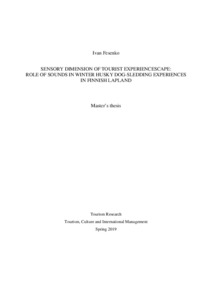Sensory dimension of tourist experiencescape : role of sounds in winter Husky dogsledding experiences in Finnish Lapland
Fesenko, Ivan (2019)
Avaa tiedosto
Husky dog sledding soundscape 1
Husky dog sledding soundscape 2
Husky dog sledding soundscape 3
Husky dog sledding soundscape 4
Husky dog sledding soundscape 5
Husky dog sledding soundscape 6
Husky dog sledding soundscape 7
Husky dog sledding soundscape 8
Lataukset:
Fesenko, Ivan
Lapin yliopisto
2019
Julkaisun pysyvä osoite on
https://urn.fi/URN:NBN:fi-fe2019032910465
https://urn.fi/URN:NBN:fi-fe2019032910465
Tiivistelmä
Throughout the history body senses have been viewed as a medium for humans to perceive the outer world and make conclusions about the surrounding environment. In the various spheres of science, body senses were studied in their relation to physical body, mind, psychological and physiological process triggered by body. In the context of recently evolved experience economy, senses are viewed as a susceptible account, which needs to be stimulated by experience providers to create memorable experiences.
The way body senses shape the perception of environment is contextualized with the help of sensescapes, which identify and describe the sensual context of the environment. To understand the importance of sensescapes in tourist experiences, the model of experiencescape is presented in this study with sensescapes being a part of it. Experiencescape is a wider framework describing the various constituents of tourist experience, including the physical environment, as well as non-tangible matters such as sensory dimension of it. As one of the senses representing interest for the author is hearing, the soundscape, as part of the sensescapes is under closer analysis in the study.
The main aim of this work is to examine the way senses influence the creation of the overall tourist experience on the example of husky dog-sledding safaris taking place in Finnish Lapland. The overall tourist experience is viewed as a phasic process, involving the stages of pre-, actual and post-experience. The relationship between the sonic environment of experience and the tourist is analyzed as part of this research.
Data was collected through semi-structured interviews with the tourists when they returned after their experience. The author used his professional situatedness of a tour guide to have a closer exposure to the respondents and to the experienced soundscapes. He used the sound walk and sound elicitation methods to stimulate sensory memories of respondents for deeper results. Data was analyzed by content analysis method through transcription of the interviews, categorizing, coding and formulating the general outcomes.
Main findings indicate that body senses create an image of the experience in consumers’ mind, though not serving as a primary trigger towards the actual experience. Vision has been proven to be the major sense affected during the husky dog-sledding safaris, however, such important matters as authenticity, emotional bonding with dogs, weather and crowdedness came up. The sounds were found to be an important component, influencing the overall experience during the certain stages. Numerous managerial implications are derived from this study to guide safari companies in Lapland for a creation of better tourist experiences.
The way body senses shape the perception of environment is contextualized with the help of sensescapes, which identify and describe the sensual context of the environment. To understand the importance of sensescapes in tourist experiences, the model of experiencescape is presented in this study with sensescapes being a part of it. Experiencescape is a wider framework describing the various constituents of tourist experience, including the physical environment, as well as non-tangible matters such as sensory dimension of it. As one of the senses representing interest for the author is hearing, the soundscape, as part of the sensescapes is under closer analysis in the study.
The main aim of this work is to examine the way senses influence the creation of the overall tourist experience on the example of husky dog-sledding safaris taking place in Finnish Lapland. The overall tourist experience is viewed as a phasic process, involving the stages of pre-, actual and post-experience. The relationship between the sonic environment of experience and the tourist is analyzed as part of this research.
Data was collected through semi-structured interviews with the tourists when they returned after their experience. The author used his professional situatedness of a tour guide to have a closer exposure to the respondents and to the experienced soundscapes. He used the sound walk and sound elicitation methods to stimulate sensory memories of respondents for deeper results. Data was analyzed by content analysis method through transcription of the interviews, categorizing, coding and formulating the general outcomes.
Main findings indicate that body senses create an image of the experience in consumers’ mind, though not serving as a primary trigger towards the actual experience. Vision has been proven to be the major sense affected during the husky dog-sledding safaris, however, such important matters as authenticity, emotional bonding with dogs, weather and crowdedness came up. The sounds were found to be an important component, influencing the overall experience during the certain stages. Numerous managerial implications are derived from this study to guide safari companies in Lapland for a creation of better tourist experiences.
Kokoelmat
- Pro gradu -tutkielmat [4958]
